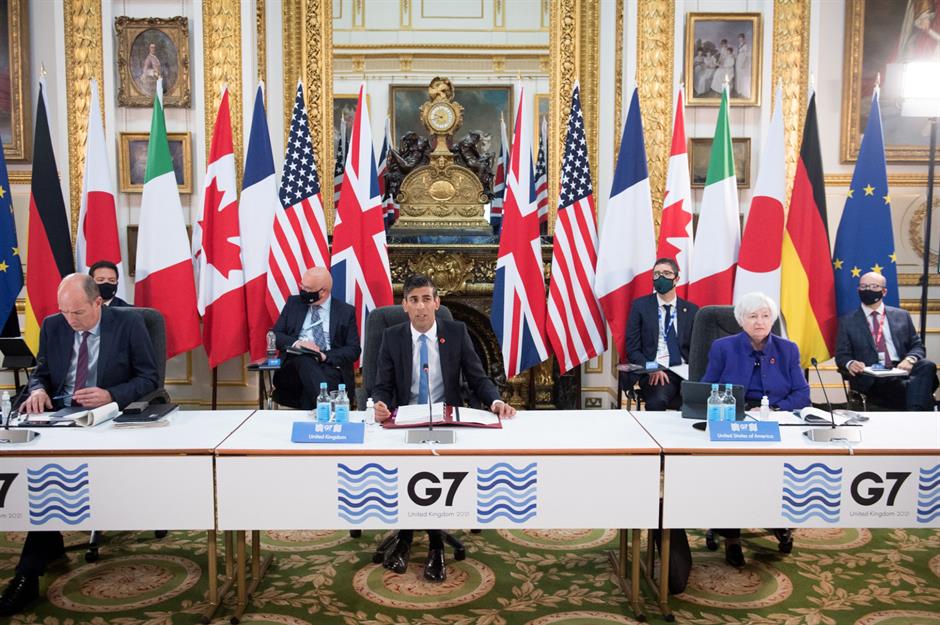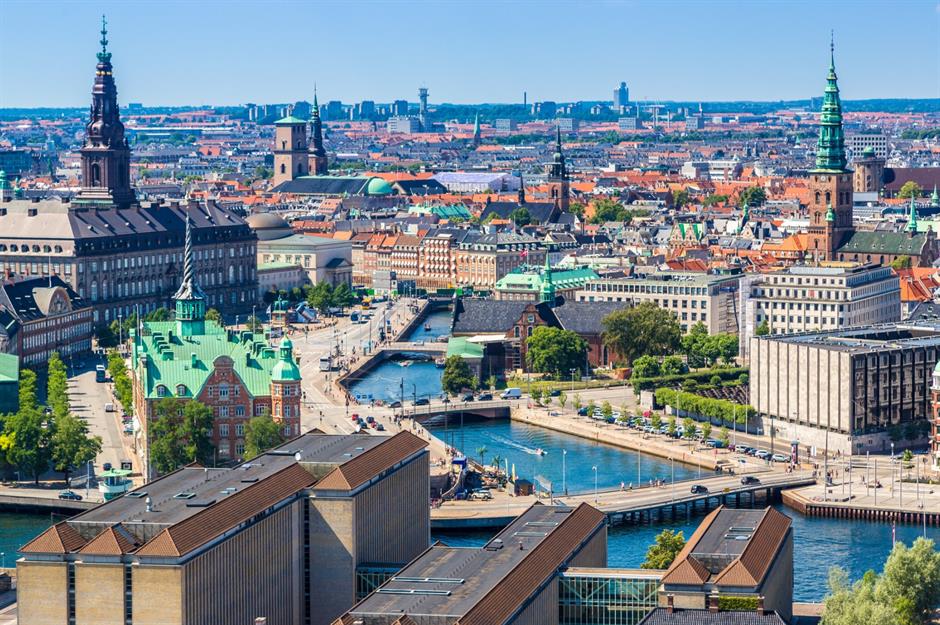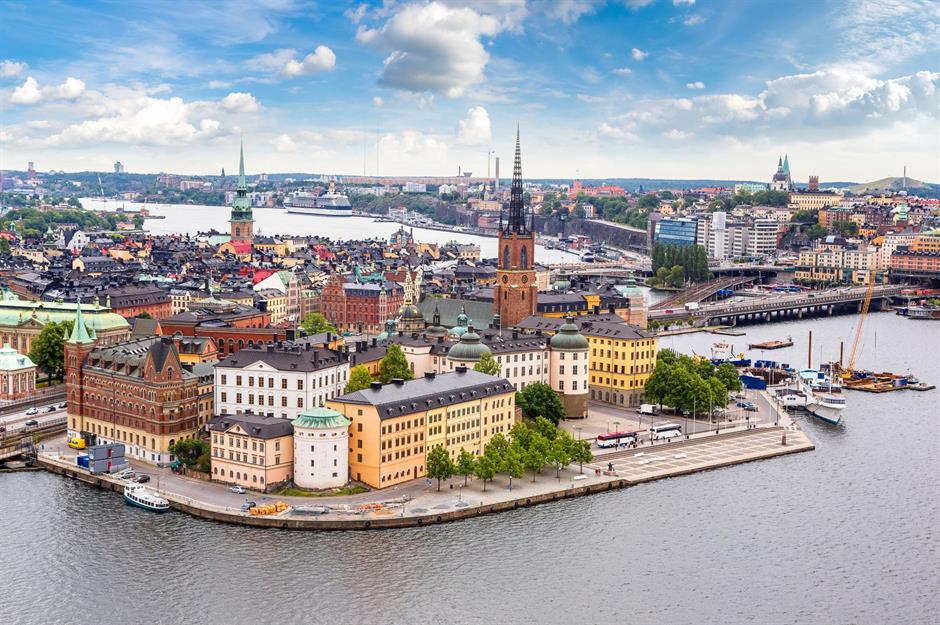Countries with the lowest corporate tax rates
Governments unite on corporation tax

In 2021, governments from 136 countries pledged to create a minimum global corporation tax rate of at least 15% for rich multinational enterprises (MNEs) by 2023.
The historic agreement was led by the Organisation for Economic Co-operation and Development (OECD), which revealed that around $150 billion (£109bn) could be generated annually by the new rules, helping economies recover from COVID-19.
With that in mind, read on to find out how much corporate income tax (CIT) 30 major countries – including the G7 – currently charge businesses. All dollar amounts in US dollars.
30th: Netherlands: 25.8%

In the Netherlands, smaller businesses are liable for lower corporate tax rates. Flemish firms pay a minimum of 19% if their annual profits are less than €200,000 ($214k/£173k), while the standard rate of 25.8% applies if they make more.
Companies can also be rewarded with a number of tax benefits, innovation credits, and generous grants.
Joint 29th. Belgium: 25%

Belgium is undeniably one of Europe’s tougher locations when it comes to CIT, though it has been steadily reducing what it charges.
Prior to the Belgian government cutting it to 29% in 2018, the figure once sat at a hefty 33.99%. In 2020, the rate was reduced by a further 4%, meaning that it currently sits at 25%.
Small and medium-sized enterprises (SMEs) can pay a reduced rate of 20% on their first €100,000 ($109k/£86k).
Joint 29th. Spain: 25%

Following the financial crash that rocked Spain between 2008 and 2014, the country's economy has been making a slow but steady recovery.
This can partly be explained by its competitive corporate tax rate of 25%. The rate had peaked at 35% during the 2000s before being gradually lowered to stimulate growth. It initially dropped to 32.5% in 2007, then to 30% in 2008. It later fell further to 28% in 2015 before finally settling at 25% in 2016.
Joint 29th. Turkey: 25%

Previously a low corporate tax trailblazer, Turkey reduced the levy to just 20% back in 2006, before increasing it to 22% in 2018. The rate was set to go back down to 20%, yet remained at 22% through both 2019 and 2020.
A draft bill in April 2021 proposed that the corporate tax rate should actually be increased, with plans for it to rise to 25% for the 2021 tax year and then 23% for the year after. However, the tax rate is currently still 25%.
Joint 29th. United Kingdom: 25%

The UK was set to reduce its corporate tax rate by 2% to 17% by April 2020.
In November 2019, however, Prime Minister Boris Johnson shelved this plan, deciding to use the money made from those taxes – a whopping £6 billion ($8bn) – on public services instead.
As of April 2023, the UK increased its corporation tax rate to 25% for companies with profits that exceed £250,000 ($318k), with the money going towards the cost of the coronavirus pandemic. Companies with revenues of £50,000 ($62k) or less will continue to be taxed at 19%.
Joint 25th. Austria: 24%

Austria has one of Europe's most pro-business tax regimes. Firms that are headquartered in the country pay a unified rate of 24% and can take full advantage of other incentives, including generous research & development (R&D) tax reliefs.
The nation's former chancellor, Sebastian Kurz, announced plans for reducing corporate tax from 25% to 23% in 2022, and then down to 21% in 2023.
However, the rate was still 25% until 2022, when it dipped to 24%. PwC's Tax Summaries states that it will be reduced to 23% from next year, which is still significantly higher than the 15% minimum.
Joint 25th. South Korea: 24%

South Korea's corporate tax rate rose by 3% in 2018, bringing it to 25% as a standard.
The increase was due to pay for social welfare programmes and new public sector jobs. However, a negative impact was quickly felt, with the move causing domestic investment to fall by an incredible 20 trillion won ($17bn/£13bn) that year.
This might just explain why South Korea approved corporate tax reforms that saw the rate fall by 1% for every taxable income bracket, with 24% now the highest.
Joint 25th. Italy: 24%

While businesses in Italy are obliged to pay a 24% flat rate tax and a 3.9% municipal tax, all is not as it seems.
According to a Congressional Budget Office (CBO) report, many businesses are eligible for rebates and credits that can all but cancel out their annual bill.
In August 2023, Italy set shockwaves around the financial sector by hitting banks with a one-off 40% tax on profits reaped from higher interest rates. In a press conference at the time, Deputy Prime Minister Matteo Salvini commented: “One has only to look at banks’ first-half profits … to realize that we are not talking about a few millions, but … of billions."
22nd. Japan: 23.2%

Keen to stimulate Japan's economy, which has been stuck in a low-growth rut, the now ex-Prime Minister Shinzō Abe's government was committed to lowering the nation's corporate tax rates.
New measures were revealed in 2021, which included a reduced tax rate for companies that agreed to increase wages by 3% or more, as well as a rate of 20% for businesses that invested in innovative new technologies. The standard corporate tax rate currently sits at 23.2%.
21st. Israel: 23%

Rather than impose a flat CIT rate that could penalise smaller businesses, Israel cuts low income companies some slack by taxing them at just 6% on their annual profits.
Otherwise, firms in the country pay 23%, which was reduced from 24% in 2018 and has remained the same ever since.
Joint 20th. Greece: 22%

In 2019, Greek authorities confirmed that the country's corporate tax rate would be slashed from 28% to 24% in a bid to stimulate its economy.
As part of the same announcement, Greek PM Kyriakos Mitsotakis said that the country’s corporate tax rate would eventually be cut down to 20% by 2021.
While this has yet to happen – perhaps due to the unexpected impact of COVID-19 – the rate has still been fractionally reduced and currently stands at 22%.
Joint 20th. Norway: 22%

Like many other countries around Europe, Norway has reduced its corporate tax rate in a bid to entice foreign investors.
The rate sat at 28% for years until 2014, when it was lowered to 27%. Over the following years, the tax has been further reduced and it currently sits at its 2019 rate of 22%.
Joint 20th. Denmark: 22%

Denmark offers a lot more to foreign investors than just its low corporate tax rate of 22%.
Wealthy foreign workers can benefit from making almost no social security contributions and there's even a special taxation scheme for high-salaried expats. They can pay just 27% income tax for the first seven years they spend working in the country – although there is an 8% labour market contribution to factor in, as well.
That's quite the bargain when compared to the standard rate, which can stretch as high as 56.5% depending on how much you earn.
Joint 17th. USA: 21%

The Trump administration lowered the corporate tax rate from 35% to 21% in 2017, explaining that the reform would allow the average American household to see an income increase of around $4,000 (£3k).
Business investment increased following the cut, although not on the scale originally anticipated.
The US Treasury Secretary Janet Yellen called for a global minimum corporate tax rate back in April 2021, claiming it would be a means to end the "race to the bottom" between countries seeking to attract the interest of overseas businesses.
Just two months later, Yellen would attend the G7 finance ministers' meeting in London, where an initial agreement about MNEs paying a minimum CIT rate was made.
Joint 17th. Slovakia: 21%

At the start of the millennium, Slovakia's corporate tax rate sat at 29%. Reforms carried out in the early 2000s saw it drop down to 19% by 2004, although it jumped back up to 23% in 2013.
The figure was then reduced to 22% the following year and it was fractionally cut again to 21% in 2017.
Interestingly, the country has actually abolished a number of taxes over the years, including inheritance tax.
15th. Sweden: 20.6%

Sweden once had one of the highest corporate tax rates in the world, peaking at a staggering 60.1% in 1989. Since then, successive governments have lowered the amount of tax that companies are required to pay.
In 2019, corporate tax was reduced to 21.4% before being further cut to 20.6% from 1 January 2021, making the Scandinavian country more business-friendly than most.
Joint 14th. Finland: 20%

Generally speaking, taxes in Finland tend to be on the steep side. VAT is charged at up to 24% on many goods and services, while income tax can be excessive, coming in at up to 56.95%. In fact, taxpayers are even liable for an income-based "church tax".
It's not all doom and gloom for businesses though: at 20%, the country's CIT rate is actually pretty low.
Joint 14th. Estonia: 20%

Estonia is considered one of the most attractive countries for foreign companies to consider moving into. Its low corporate tax rate of 20% only applies to distributed profits, while any profits generated abroad are totally exempt from taxation.
As of 2018, companies that make regular profit distributions are applicable for a lower corporate tax rate of 14%.
Estonia is one of several EU nations that rejected the 2021 proposal for a global minimum corporation tax rate, although has since signed the agreement.
Joint 14th. Iceland: 20%
.jpg)
Likewise, Icelandic firms pay only 20% corporate tax. The country cut the rate from 33% in the 90s to just 15% in 2008, before moving up to its current rate in 2011.
Iceland is now seen as a leader in low enterprise taxation and appears to be a largely straightforward place to do business.
Joint 14th. Latvia: 20%

In Latvia, businesses both big and small can benefit from low corporate tax rates.
A standard rate of 20% applies to larger, higher-revenue companies. Smaller microenterprises pay a reduced rate that sits between 9% and 18% depending on their turnover and the number of years that they've been operational.
Joint 10th. Czech Republic: 19%

An appealing destination for international investors and workers alike, the Czech Republic currently has a low corporate tax rate of 19%. From January 2024, however, this figure is expected to rise to 21%.
Since last year, banks and energy companies have been required to pay a "windfall tax" of 60% on excess profits, in a bid to provide funding for the people and businesses that have been hit hardest by rising utility prices.
Joint 10th. Poland: 19%

While Poland may have a low corporate tax rate of 19%, its government has still been busy cracking down on the firms that are registered in tax havens, transfer profits abroad, or generally fail to pay their fair share.
In a similarly fair vein, 2019 saw the country scrap income tax for around two million workers under the age of 26. The decision was part of an attempt to prevent the country’s best and brightest talent from seeking better (and more affordable) prospects abroad.
Joint 10th. Slovenia: 19%

Slovenia raised its corporate tax rate from 17% to 19% in 2017.
The increase was implemented to finance a cut in its income tax, which, with the top band reaching up to 50%, was considered excessively high.
Joint 7th. Luxembourg: 15%

In Luxembourg, companies with a taxable income that doesn't exceed €175,000 ($192k/£151k) face a CIT of 15%.
But for companies based in the capital of Luxembourg City, other taxes – such as the solidarity surtax of 7% and the 6.75% municipal business tax rate – can mean they can end up paying a rate of 24.94% overall.
Joint 7th. Germany: 15%

Businesses in Germany pay corporate tax at a rate of 15%, although that isn't quite the whole story...
Companies are also subject to a solidarity surcharge of 5.5%, which takes the tax rate up to 15.825% on average. Firms are also liable for trade tax, which varies in amount depending on which city a business is based in.
Joint 7th. Canada: 15%

Canada's low corporate tax rate of 15% has enticed countless US firms over the years, although the appeal began to wane after Trump's dramatic corporate tax cut in 2017.
Capital started to head south and the country has struggled to hold on to some companies – particularly in the oil and gas sector, where new regulations have driven out more than $30 billion (£23bn) of foreign investment in recent years.
Joint 7th. Lithuania: 15%

Corporate tax in Lithuania also sits at 15%, while a reduced rate of 5% can be offered to "micro companies".
These are defined as businesses with up to 10 employees that generate no more than €300,000 ($356k/£276k) in income per year. On top of that, these firms can also benefit from paying 0% CIT for their first year of trading.
3rd. Ireland: 12.5%-15%

Ireland’s low corporate tax rate of 12.5% transformed its economy and has helped attract the attention of major companies. In fact, heavyweights such as Google, Facebook, and Apple have all chosen the Emerald Isle as the base for their European operations – so it's little wonder that the country initially rejected the idea of the global minimum.
In October 2021, however, Ireland finally agreed to comply with the 15% minimum corporate tax rate, under certain conditions. Only companies with global revenues in excess of €750 million ($800m/£651m) will be taxed at 15% from January 2024, in a move that will affect 56 Irish multinational businesses and 1,500 foreign-owned multinationals.
According to reports, more than 160,000 other companies won't be affected by the change.
2nd. Hungary: 9%-15%

In 2017, Hungary reduced its corporate tax rate from 19% to 9%, officially giving it the lowest rate in the European Union. The move came as part of Prime Minister Viktor Orbán's mission to attract significant foreign investment.
Like Ireland, Hungary has previously resisted calls for a 15% minimum global tax rate. After securing several key changes to the agreement, however, including the introduction of a 10-year transition period, the country has agreed to implement the change.
Speaking in October 2021, the Hungarian finance minister Mihaly Varga said: "Hungary's position has been consistent throughout: we made it clear that we would only adopt a global minimum tax that does not lead to a tax increase in Hungary, does not endanger the competitive advantage of the Hungarian economy, and protects the workplaces of the Hungarian people". The new rules will reportedly only affect multinational businesses.
1st. Switzerland: 8.5%-15%

On paper, Switzerland currently boasts the lowest corporate tax rate in the world, with company profits being taxed at just 8.5% at the federal level.
However, the country's cantons (districts) can impose further taxes, which can push a firm’s corporate tax rate to somewhere between 11.9% and 21%, depending on turnover.
Over the summer, Swiss voters overwhelmingly voted in favour of increasing CIT to 15%, with multiple news sources suggesting the new rate could be in place from January 2024. Watch this space...
Now find out where in the world people pay the lowest taxes
Comments
Do you want to comment on this article? You need to be signed in for this feature